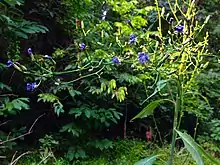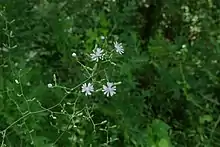Lactuca floridana
Lactuca floridana, commonly known as woodland lettuce,[3] Florida lettuce,[4] or false lettuce[5] is a North American species of wild lettuce. It is native across much of central Canada and the eastern and central United States.
| Woodland lettuce | |
|---|---|
 | |
| Scientific classification | |
| Kingdom: | Plantae |
| Clade: | Tracheophytes |
| Clade: | Angiosperms |
| Clade: | Eudicots |
| Clade: | Asterids |
| Order: | Asterales |
| Family: | Asteraceae |
| Genus: | Lactuca |
| Species: | L. floridana |
| Binomial name | |
| Lactuca floridana (L.) Gaertn. 1791 | |
| Synonyms[2] | |
|
Synonymy
| |
Lactuca floridana is an annual or biennial plant in the Cichorieae (dandelion) tribe within the Asteraceae (daisy) family. Lactuca floridana was found to contain 11β,13-Dihydro-lactucin-8-O-acetate hemihydrate.[6]
Description
L. floridana is a tall plant, growing to a height of 0.9–2.4 m (3–8 ft). It is usually unbranched with a central stem that is light or reddish green and hairless.[7] It has a pure white, milky sap. The leaves are alternate, lanceolate-oblong, and up to 25 cm (10 in) long and 8 cm (3 in) across. The largest leaves are often deeply pinnately lobed, although the leaves in general are variable and can be lobed or unlobed.[4]
The top of the stem bears a multibranched inflorescence with many flower heads. Each head contains 10–20 blue or white ray florets but no disc florets. The fruit is a brown achene.[8]

Etymology
The genus name Lactuca is based on the Latin word for milk, "lac", and refers to the milky sap. The specific epithet means "of Florida".[9]
Distribution and habitat
L. floridana is native in the United States from Texas to the west, Florida to the south, Massachusetts to the east, and the Canadian border to the north. In Canada it is native in Manitoba and Ontario, although it is possibly extirpated in Manitoba and it's critically imperiled in Ontario.[10] Habitats include disturbed areas, prairies, along roadsides, pastures, and miscellaneous waste areas.[7]
Ecology
The plant blooms from July to October, and the nectar and pollen of the flowers attract bees.[7]
References
- "NatureServe Explorer 2.0". explorer.natureserve.org.
- Tropicos, Lactuca floridana (L.) Gaertn.
- USDA, NRCS (n.d.). "Lactuca floridana". The PLANTS Database (plants.usda.gov). Greensboro, North Carolina: National Plant Data Team. Retrieved 2 August 2015.
- "Lactuca floridana page". www.missouriplants.com.
- "Lactuca floridana (False Lettuce, Florida Lettuce) | North Carolina Extension Gardener Plant Toolbox". plants.ces.ncsu.edu.
- Fronczek; Gomez-Barrios; Fischer; Fronczek (1 October 2009). "11β,13-Dihydrolactucin-8-O-acetate hemihydrate". Acta Crystallogr E. 65 (Pt. 10): o2564–o2565. doi:10.1107/S160053680903829X. PMC 2970292. PMID 21578003.
- "Wild Lettuce (Lactuca canadensis)". www.illinoiswildflowers.info.
- Flora of North America, Lactuca floridana (Linnaeus) Gaertner, 1791.
- "Lactuca floridana - Plant Finder". www.missouribotanicalgarden.org.
- Biota of North America Program 2014 county distribution map
- "Florida Lettuce (Woodland Lettuce)". Missouri Department of Conservation.
